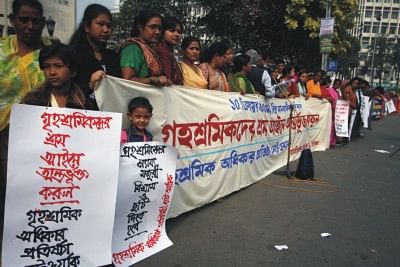Enslaved in our homes

The rights of domestic workers must be upheld. Photo: A.M. Ahad/ Drik News
THE Constitution of Bangladesh guarantees equal rights to all citizens of the country irrespective of gender, age, class and religion. In reality, however, a large number of our citizens remain entrapped as modern-day slaves in the homes of the more fortunate people. Domestic help, particularly under-aged females, have no rights whatsoever as they slave away in our homes with little hope for the future.
In almost all households in cities and towns, young girls and boys are ostensibly employed to help do the chores. The picture is dismal if one realises the condition in which the domestics are actually required to work.
They get up at dawn, before any member of the family wakes up from sleep, and stay up late at night until everyone goes to bed. These marginalised boys and girls have to do all kind of work; mopping the floor, washing up in the kitchen, cleaning the bathrooms, washing clothes, grinding spices and everything else that you can name.
People who have domestic help get them through different sources. A traditional way of wooing them is by using known villagers who find absolutely poor boys and girls who can't be properly looked after by their unlucky poverty-ridden parents. Allured by many promises, they allow their children to be employed in households in urban areas across the country.
Once these children are brought in, their masters promise them good food, clothes and, of course, a monthly salary. In reality, though, most of these promises are not kept. Many of these emaciated children are paid only a negligible amount of money, which they send home to support their parents. Often, the masters tell the parents of these children, particularly girls, that when they grow up in a few years financial support wouldn't be a problem for their marriage.
These promises usually never get translated into reality. After years of domestic slavery, the parents of these unfortunate victims try hard to get back their children. At times they succeed if the masters have a little bit of compassion, otherwise they have to return to their villages in frustration and seething with anger. They have no power to save their children because they are afraid of the clout of their masters.
Many of these domestic help are forced to live like chattels, deprived of even the most basic human rights. They sleep on the floor, eat leftover food and get malnourished over the years. They are subjected to this inhumane treatment at an age when they are supposed to be at school.
Except for a few kind masters, most of these domestics are deprived of even the basic education that the state guarantees them. Of course, in exceptional cases, there are kind people who give them some opportunities for studying. I know a senior professor at Dhaka University who supported his male domestic help to get a Bachelors degree. These are rare instances and are only exceptions, but by no means the rule.
Newspapers regularly publish horrific stories of torture and even mutilation of domestic help. Many housewives, and even their husbands, have been arrested by the police for committing atrocities on their domestics. Young girls are often beaten up by angry housewives.
In cases when the punishment gets too severe, and the young maid suffers from burn injuries or starts bleeding following the physical assault, kind neighbours come to their help and shift them to hospitals.
Bangladesh is now in a stage of transition as we can foresee a prosperous future within a few decades. As we prepare to move ahead and leave behind the years of impoverishment and underdevelopment, we have to make sure that our sense of humanity also increases.
Without development of humane values technological advancement will not be sufficient to build an egalitarian society where people of all classes can be ensured of basic human rights. Technology can only contribute to increasing our standard of living if we can be true human beings with the right emotions and attitudes.
Employment of maids at home is not unusual even in industrialised countries, where they are given a handsome salary and are not looked down upon. The work of a maid is not slavery and only the rich and affluent can afford to have maids in those countries. The state never tolerates any undue advantages taken from maids or domestic help.
In Bangladesh, in the absence of stringent laws regulating the employment of domestic helps, many people take it for granted that the children who work in their homes are inferior humans. This feeling grows because of the lack of conscience and compassion among many of us who are fortunate in terms of social status and financial solvency.
This cannot under any circumstances make us forget that the young kids we employ are children of our own society. They are not chattels and we must at least treat them with respect and kindness.
Golam Sarwar Chowdhury is Professor of English at University of Liberal Arts Bangladesh.

 For all latest news, follow The Daily Star's Google News channel.
For all latest news, follow The Daily Star's Google News channel. 



Comments